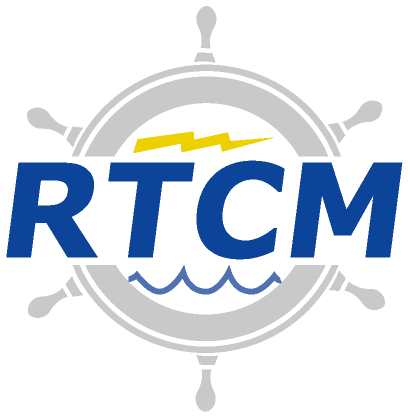Committees
RTCM Special Committees are chartered to address in-depth radio communication and radio navigation areas of concern to the RTCM membership. The output documents and reports prepared by these Committees are usually published as RTCM Standards. Special Committees are chaired by a subject expert, appointed from an RTCM member organization. All RTCM member organizations are eligible to participate in any Special Committee activity. Participation may be both by correspondence (usually E-mail), and through attendance at meetings. Special Committee output documents in the form of RTCM Recommendations have been widely accepted for both voluntary and mandatory use, and the Special Committees routinely update the Recommendations to reflect ongoing changes in technology. Current Special Committees include:
Special Committee 101 on Digital Selective Calling (DSC)
Special Committee 104 on Differential Global Navigation Satellite Systems (DGNSS)
Special Committee 109 on Electronic Charting Technology
Special Committee 110 on Emergency Beacons
Special Committee 112 on Ship Radar
Special Committee 117 on Maritime VHF Interference
Special Committee 119 on Maritime Survivor Locating Devices
Special Committee 121 on Automatic Identification Systems (AIS) and Digital Messaging
Special Committee 123 on Digital Message Services over Maritime Frequencies
Special Committee 127 on Enhanced Loran (eLoran)
Special Committee 128 on Satellite Emergency Notification and Location Devices (SENDs)
Special Committee 129 on Portrayal of Navigation-Related Information on Shipboard Displays
Special Committee 130 on Electro-Optical Imaging Systems for Maritime Applications
Special Committee 131 on Multi-System Shipborne Navigation Receivers
Special Committee 132 on Electronic Visual Distress Signaling Devices (eVDSDs)
Special Committee 133 on Data Exchange for Navigation-Related Applications for Mobile Devices
Special Committee 134 on Integrity Monitoring for High Precision GNSS-Based Applications
Special Committee 135 on Radio Layer for Real-Time DGNSS Applications
Special Committee 136 on Beacon Type Approvals
Special Committee 137 on Electromagnetic Compatibility Requirements for LED Devices and other Unintentional Emitters Located Near Shipboard Antennas
Special Committee 138 on Ranging Mode (R-Mode) Application for VHF Data Exchange System (VDES)
Special Committee 139 on Digital Maritime Messaging Service
Special Committee 140 on Dual Frequency Multi Constellation (DFMC) GNSS
Special Committee 141 on Lateral Range Curves
RTCM also has a number of subject specific interest groups which are not currently developing or maintaining RTCM standards. These include:
- Mailing List (ML) 107 on Maritime Safety Information Dissemination
- Mailing List (ML) 120 on High Speed Craft
- Mailing List (ML) 122 on Ship Security Alert Systems
- Mailing List (ML) 124 - Maritime HF Users Interest Group
- Mailing List (ML) 126 - Voyage Data Recorders
RTCM STANDARDS
The current technical standards developed by the Special Committees include:
-
RTCM Recommended Minimum Standards for Digital Selective Calling (DSC) Equipment Providing Minimum Distress and Safety Capability, Version 1.0 (RTCM Paper 56-95/SC101-STD)“ This standard is referenced in the regulations of the U.S. Federal Communications Commission and defines minimum functions for DSC transceivers used in the U.S.
-
RTCM 10150.0 Standard for VHF-FM Portable Marine Radiotelephone Equipment with Digital Selective Calling (DSC) and Global Navigation Satellite System (GNSS) Location Function
-
RTCM 10402.3 RTCM Recommended Standards for Differential GNSS (Global Navigation Satellite Systems) Service, Version 2.3“ This standard is used around the world for differential satellite navigation systems, both maritime and terrestrial.
-
RTCM 10403.3, Differential GNSS (Global Navigation Satellite Systems) Services - Version 3 - A more efficient alternative to RTCM 10402.3
-
RTCM 10410.1, Standard for Networked Transport of RTCM via Internet Protocol (Ntrip) - An application-level protocol that supports streaming Global Navigation Satellite System (GNSS) data over the Internet.
-
RTCM 10401.2, Standard for Differential Navstar GPS Reference Stations and Integrity Monitors (RSIM) - A companion to RTCM 10402.3, this standard addresses the performance requirements for the equipment which broadcasts DGNSS corrections.
-
RTCM 10900.6 RTCM Standard for Electronic Chart Systems (ECS) - A new edition of RTCM’s ECS standard, it defines requirements for Electronic Chart Systems which are not intended to meet the international requirements of the Safety of Life at Sea Convention (SOLAS), and includes certain voyage data recording functions.
-
RTCM 11000.3, Standard for 406 MHz Satellite Emergency Position-Indicating Radiobeacons (EPIRBs). This standard is referenced in the regulations of the U.S. Federal Communications Commission and defines performance requirements for EPIRBs used on U.S.-registered vessels.
-
RTCM 11010.2, Standard for 406 MHz Satellite Personal Locator Beacons (PLBs)“ Closely related to the previous standard, it too is referenced in the regulations of the U.S. Federal Communications Commission and defines performance requirements for PLBs used in the U.S., primarily in terrestrial applications.
-
RTCM 11020.1, Standard for Ship Security Alert Systems (SSAS) using the Cospas-Sarsat System, Version 1.0 (RTCM Paper 110-2004/SC110-STD) - Minimum requirements for the functional requirements and technical performance of maritime satellite Ship Security Alert Systems (SSAS) operating in the 406 MHz band through the Cospas-Sarsat satellite system.
-
RTCM 11701.0, Standard for Installed Maritime VHF Radiotelephone Equipment Operating in High Level Electromagnetic Environments (RTCM Paper 87-99/SC117-STD)“ Defines a test program to demonstrate satisfactory operation of INSTALLED VHF radios in areas where they might be susceptible to interference from other radio frequency devices, such as pagers.
-
RTCM 11702.0, Standard for Portable Maritime VHF Radiotelephone Equipment Operating in High Level Electromagnetic Environments“ Defines a test program to demonstrate satisfactory operation of PORTABLE VHF radios in areas where they might be susceptible to interference from other radio frequency devices, such as pagers.
-
RTCM 11901.1, Standard for Maritime Survivor Locating Devices (MSLD) Addresses the several ways in which man-overboard devices can operate.
-
RTCM 12301.1, Standard for VHF-FM Digital Small Message Services - Specifies the minimum functional and technical requirements for VHF-FM Digital Small Message Services (VDSMS). VDSMS are intended to provide for short messaging from ship-to-ship, shore-to-ship and ship-to shore
-
RTCM 12800.0 Standard for Satellite Emergency Notification Devices (SEND) - Contains minimum requirements for the functional and technical performance of Satellite Emergency Notification Devices (SENDs) operating over any satellite system except Cospas-Sarsat.
RTCM Standards can be purchased online.
|

